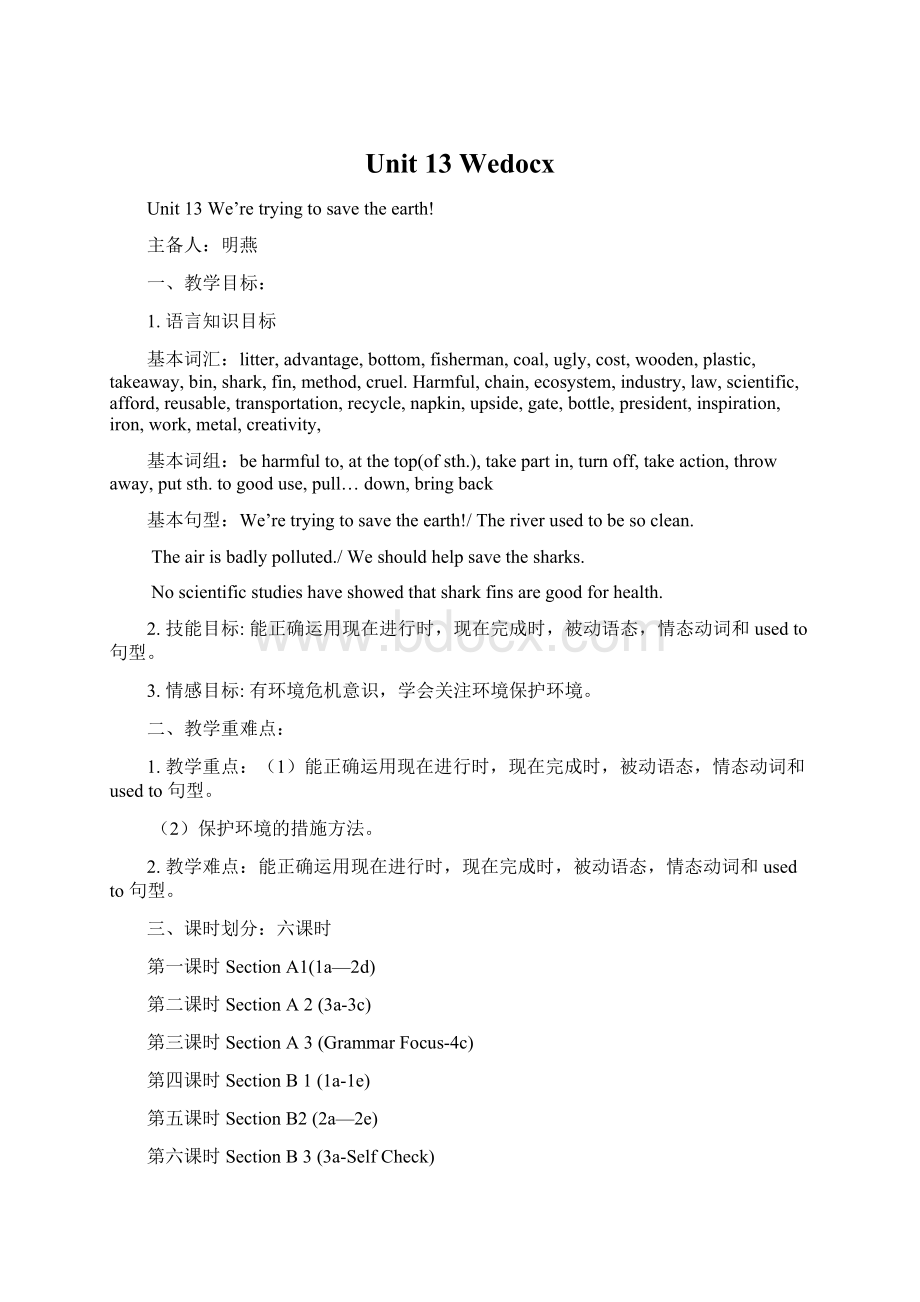Unit 13 Wedocx.docx
《Unit 13 Wedocx.docx》由会员分享,可在线阅读,更多相关《Unit 13 Wedocx.docx(12页珍藏版)》请在冰豆网上搜索。

Unit13Wedocx
Unit13We’retryingtosavetheearth!
主备人:
明燕
一、教学目标:
1.语言知识目标
基本词汇:
litter,advantage,bottom,fisherman,coal,ugly,cost,wooden,plastic,takeaway,bin,shark,fin,method,cruel.Harmful,chain,ecosystem,industry,law,scientific,afford,reusable,transportation,recycle,napkin,upside,gate,bottle,president,inspiration,iron,work,metal,creativity,
基本词组:
beharmfulto,atthetop(ofsth.),takepartin,turnoff,takeaction,throwaway,putsth.togooduse,pull…down,bringback
基本句型:
We’retryingtosavetheearth!
/Theriverusedtobesoclean.
Theairisbadlypolluted./Weshouldhelpsavethesharks.
Noscientificstudieshaveshowedthatsharkfinsaregoodforhealth.
2.技能目标:
能正确运用现在进行时,现在完成时,被动语态,情态动词和usedto句型。
3.情感目标:
有环境危机意识,学会关注环境保护环境。
二、教学重难点:
1.教学重点:
(1)能正确运用现在进行时,现在完成时,被动语态,情态动词和usedto句型。
(2)保护环境的措施方法。
2.教学难点:
能正确运用现在进行时,现在完成时,被动语态,情态动词和usedto句型。
三、课时划分:
六课时
第一课时SectionA1(1a—2d)
第二课时SectionA2(3a-3c)
第三课时SectionA3(GrammarFocus-4c)
第四课时SectionB1(1a-1e)
第五课时SectionB2(2a—2e)
第六课时SectionB3(3a-SelfCheck)
第一课时SectionA1(1a-2d)
I.Warmingup
Showthepictureoftheearthandtellstudentstheearthispollutednow.
Forexample:
(1)Thefactoriesthatburncoalpollutetheairwithalotofblacksmoke.
(2)Factoriesputwasteintotheriver.
II.Presentation
1a.Herearesomewordsrelatedtodifferentkindsofpollution.Writethemintheboxbelow.Thenaddmorewords.
III.Listening
1.1bListenandcompletethesentences.Thenchecktheanswers.
2.Listenagainandcheck(√)thesentencesyouhear.
1)Wecouldgofishingintheriver.
2)Theriverwasreallydirty.
3)Theriverhasalwaysbeenthenicestriverinthistown.
4)Weshouldasktheteachersforhelp.
IV.Practice
1.Role-playtheconversationin1c.
2.Makeconversationsusingthepollutionin1a.
V.Listening
1.2aListentotheinterview.CirclethekindsofpollutionthatJasonandSusantalkabout.
2.2bListenagainandcompletethesentences.Thenchecktheanswers.
VI.ReadingRole-playtheconversation.
VII.Languagepoints
1.Everyoneinthistownshouldplayapartincleaningitup!
playapartin在……方面起作用
e.g.Agooddietplaysalargepartinhelpingpeoplelivelonger.
健康的饮食在帮助人们长寿方面起着非常大的作用。
2.Eventhebottomoftheriverwasfullofrubbish.
Yes,butpeoplearethrowinglitterintotheriver.
litter和rubbish都可指“垃圾”,用作不可数名词。
rubbish指“没用的东西(被扔或将要丢弃的无用的东西)”不可回收。
litter指“(室内或公共场所)乱扔的废物(纸屑、不要的包装纸、废瓶等)”还可回收3.It’sgoodforhealthanditdoesn’tcostanything!
costv.花费;使付出
指花费金钱,主语通常是物。
cost的过去式和过去分词均为cost。
e.g.ThenewshirtcostMrWang200yuan.王先生花了200元买了新衬衫。
Howmuchdoesthenewcomputercost?
新电脑花了多少钱?
take,spend,pay&cost
take,spend,pay和cost都可以表示“花费”,但它们的用法各有不同。
1)take多表示花费时间,常用于Ittakessb.sometimetodosth.这一句型中,其中it作形式主语。
e.g.Itusuallytakesme40minutestocookthedinner.
2)spend多表示花费时间和金钱,主语通常是人,常用于sb.spend(s)sometime/moneyonsth.和sb.spend(s)sometime/money(in)doingsth.两种句型。
e.g.Davidspent2,000yuanonthenewmachine.
Myfatherspendsanhour(in)watchingthenewsonTVeveryday.
3)pay多表示花费金钱,主语通常是人,常用于sb.pay(s)somemoneyforsth.句型。
e.g.Tommypaid20yuanforhisbreakfastyesterday.
4)cost多表示花费金钱,主语通常是物,常用于sth.cost(s)(sb.)somemoney.句型。
e.g.ThenewdresscostLinda88yuan.
IX.Homework
Recitetheconversationin2d.
Ⅹ.Teachingreflection
第二课时SectionA2(3a-3c)
I.Revision
(1)Role-play2d.
(2)TranslatethesesentencesintoEnglish.
①甚至是河底都满是垃圾。
②这个小镇上的每个人都应该参加打扫。
③骑自行车有其它的优点。
④我买外卖食品从来不拿木筷子和塑料叉子。
II.Leadin
(1)Teachertellsstudentstheearthisbadlypolluted.Whatshouldwedotosavetheearth?
Takebusesinsteadofdrivingcar.Recyclebooksandpaper.
(2)Therearesomeanimalsareendangered.Weshoulddosomethingtoprotecttheanimalsandtheenvironment!
III.Discussion
(1)Haveyoueverseenashark?
(2)Whatdoyouknowaboutsharks?
IV.Reading
(1)Sharksareendangered,readthepassageandjudgethesentences.
①Shark’sfin(鱼鳍)soupisfamousandexpensiveallaroundtheworld.
②Wehavetokillawholesharktogetabowlofshark’sfinsoup.
③Peoplecutoffsharks’finsandthrowthesharksbackintotheocean.
④Sharksareinthebottomofthefoodchainintheocean’secosystem.
WildAidandtheWWFareenvironmentalprotectiongroupsinChina.
Shark’sfinsaregoodforhealth.
(2)Completethefactsheetin3a.Thenchecktheanswers.
(3)3a.Readthepassageandfillintheblankswiththewordsinthebox.
Ⅴ.Languagepoints
1.Thismethodisnotonlycruel,butalsoharmfultotheenvironment.
这种方法不但残忍而且对环境有害。
notonly…butalso…
用于连接两个表示并列关系的成分,着重强调后者,其意为“不仅……而且……”;其中的also有时可以省略。
e.g.1)Shenotonlyplayswell,butalsowritesmusic.
她不仅很会演奏,而且还会作曲。
2)Notonlymenbutalsowomenwerechosen.
不仅仅是男的,女的也有被选中的。
若连接两个成分作主语,其谓语通常与靠近的主语保持一致。
e.g.Notonlyyoubutalsohehastoleave.不只是你,他也得离开。
notonly放在句首,后接句子时要用倒装结构。
e.g.Notonlyhadthepoormanbeenfined,butalsohehadbeensenttoprison.
这个可怜的人不仅被罚款,而且还被送进了监狱。
beharmfulto对…有害
e.g.Smokingisharmfultothehealth.吸烟有损健康。
Playingcomputergamesmuchisharmfultostudents.
电脑游戏玩太多对学生有害。
2.Sharksareatthetopofthefoodchainintheocean’secosystem.
鲨鱼位于海洋生物系统食物链的顶部。
atthetopof在...最高地位;用最高[最大]的(速度,声音等)
e.g.Ilookedatthetopofhishead,hishairshinyandpartedsmoothly.
我看他的头顶,头发光亮,分得平滑。
Heshoutedatthetopofhisvoiceinorderthathemightbeheard.
他尽力大声叫喊,以便别人能听见。
VI.Homework
Write5measurestoprotecttheenvironment.
VII.Teachingreflection
第三课时SectionA3(GrammarFocus-4c)
I.Revision
1.Checkifyouknowthesephrases.
①不同种类的污染②河底
③把垃圾扔到河里④在…中起作用
⑤在中国南部⑥对……有害
⑦在……顶部⑧海洋生态系统
2.TranslatethesesentencesintoEnglish.
①甚至是河底都满是垃圾。
②这个方法不仅残酷还对环境有害。
③鲨鱼处于海洋食物链的顶部。
④许多人相信鱼翅对健康有好处。
II.GrammarFocus:
Payattentiontothesentences.
1.现在进行时:
PresentProgressive
定义:
表示说话时(瞬间)正在进行的动作,也表示目前或现阶段一直进行的动作。
结构:
be(am/is/are)+v.-ing
标志词:
Look,Listen,now,rightnow…e.g.Look!
Theboyiscrying.
2.usedtodo与beusedtodoing
usedtodosth.表示过去常常做某事,而现在往往不做了,后接动词原形。
beusedtodoingsth.表示习惯于做某事。
e.g.Iusedtogetupatsixo’clock.
Joeisusedtodrinkingacupofcoffeeeverymorning.
3.被动语态:
Passivevoice
定义:
表示主语是动作的承受者,即行为动作的对象的一种语态。
结构:
be+过去分词e.g.Anewschoolwasbuiltlastyear.
4.现在完成时:
PresentPerfect
定义:
表示动作已经完成,但对现在造成影响;或者表示从过去某一时间开始一直延续到现在并还可能持续下去的动作。
结构:
has/have+过去分词
标志词:
already,yet,ever,never,since,for…
5.情态动词
1)情态动词本身有一定的词义,表示说话人的情绪、态度或语气,但不能单独作谓语,只能与其他动词构成谓语。
常见的有:
can(could),may(might),must,need,shall(should),will(would)等。
2)情态动词无人称和数的变化,后接动词原形。
否定式是在情态动词后面加not。
个别情态动词有过去式形式,可用来表达更加客气、委婉的语气。
III.Practice
1.Workon4a.Fillintheblankswiththecorrectformsoftheverbsinbrackets.
2.Workon4b.Fillintheblankswiththeappropriatemodalverbsfromthebox.Thewordsare:
3.Workon4c.Makealistofthingsthatpeoplecandotohelptheenvironmentanddiscussyourlistwithyourpartner.
IV.Languagepoints
1.Wecan’taffordtowaitanylongertotakeaction!
affordv.承担得起;提供,给予
affordtodosth.(常与can,bebleto连用)买得起;有足够的……
e.g.Wecan’taffordtopaysuchaprice.我们付不起这个价钱。
Dancingaffordsuspleasure.跳舞给我们带来快乐。
V.Homework:
Finishtheexercisesintheworkbook.
Ⅵ.Teachingreflection
第四课时SectionB1(1a-1e)
I.Revision
Role-playthisconversation.
A:
Ithinkthateveryoneshouldusepublictransportation.
B:
Idisagree.It’sdifficultforparentswithyoungchildrentousepublictransportation…
A:
Butwecandootherthings.Forexample,wecangotoschoolonfoot.
B:
Youareright.Weshouldturnoffthelightswhenweleavetheroom.
II.Leadingin
(1)Tellstudentsweshoulddothesethingstoprotecttheenvironment.
Turnoffthelightswhenyouleavearoom;
Stopridingincars;
Stoppingusingpapertowelsornapkins;
Recyclebooksandpaper.
Turnofftheshowerwhileyouarewashingyourhair.
Youcanhelpreducepollutionbyputtingthatsodacaninadifferentbin.
Don’tusepapernapkins.
(2)Whatcanwedotohelpsavetheearth?
Ranktheseitemsfromtheeasiest
(1)tothemostdifficult(5).(1a)
______stopridingincars
______recyclebooksandpaper
______turnoffthelightswhenyouleavearoom
______turnofftheshowerwhileyouarewashingyourhair
______don’tusepapernapkins
(3)Compareyouranswersin1awithyourpartner.
III.Listening1c&1d
(1)Listenandcheck(√)thethingsthatJuliaandJacktalkabout.
(2)Check()thethingsthatJuliaisdoingnow,thethingsshewilldointhefutureandthethingsshewouldneverdo.
(3)Checktheanswerswiththewholeclass.
(4)Listenagainandanswerthequestionsbelow.
①Whoreadabook?
②WouldJuliaturnofftheshowerwhensheiswashingthehair?
③DoesJackliveclosetoschool?
Getonestudenttowritetheanswersontheblackboard.
Keys:
Jack.
No,shewouldneverdothat.
Yes,hedoes.
IV.Practice
(1)Makeaconversationusingtheinformationfromthechartin1c.Saywhatistrueforyou.
(2)Guessinggame
Showsomepicturestostudentsandgetthemtoguesswhatthesethingsaremadefrom.
V.Summary
Thelisteningskills.
Ⅵ.Homework
Finishtheexercisesintheexercisebook.
Ⅶ.Teachingreflection
第五课时SectionB2(2a—2e)
Ⅰ.Lead—in
2aLookatthetitleandthepicturesin2b.Canyouguesswhatthepassageisabout?
Ⅱ.Reading
Usepicturestopresentthenewwords.
(1)Readthepassageandanswerthequestionsbelow
①WhoisAmyHayes?
②Howmanypeoplearementionedinthepassage?
Whoarethey?
(2)Readthepassageandcompletethechartbelow.
(3)Readparagraph2andanswerthequestions.
①Didshewinanaward